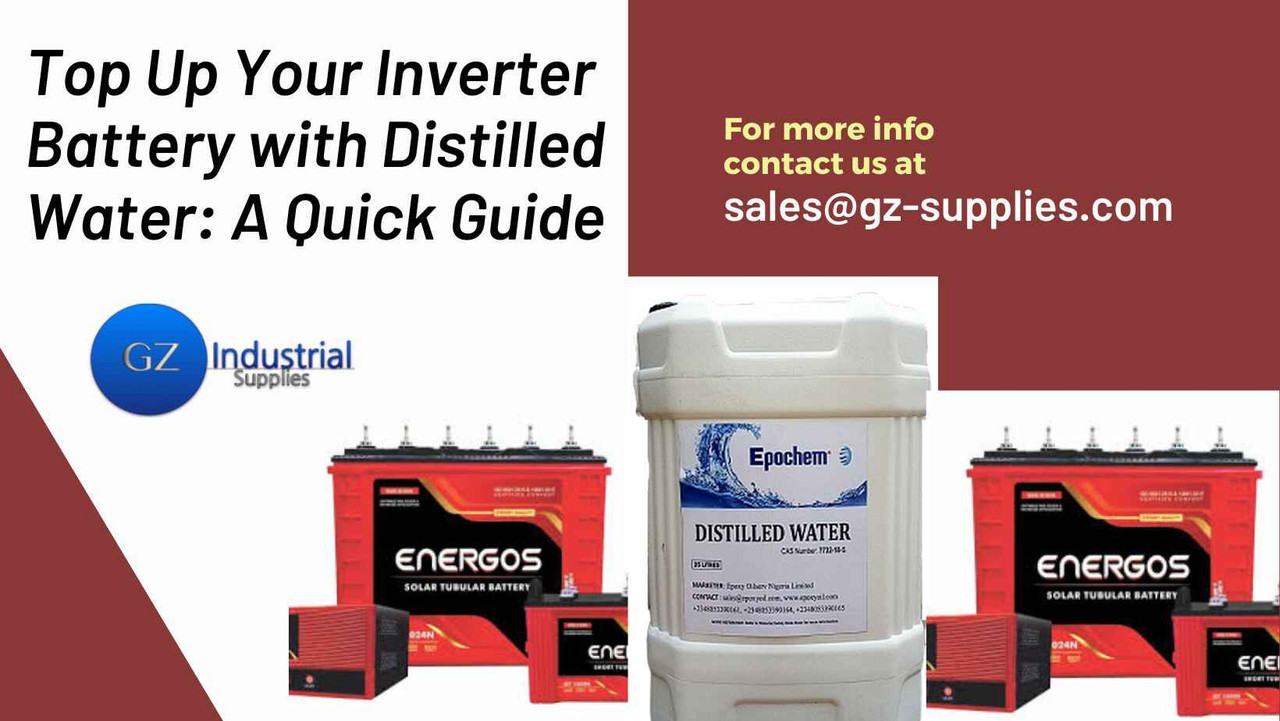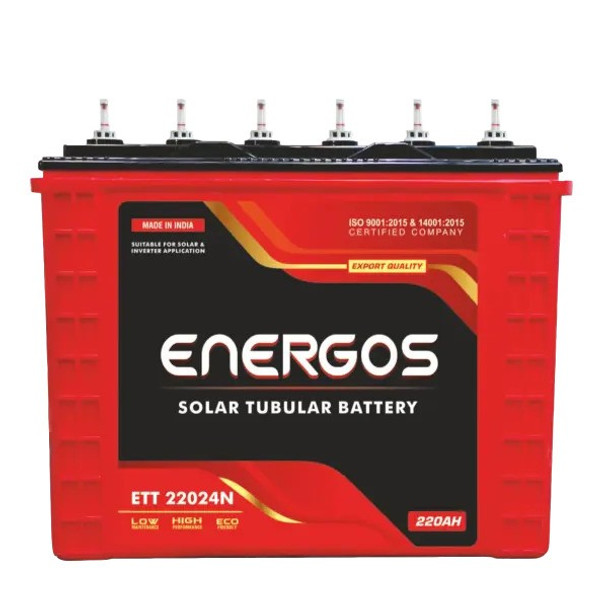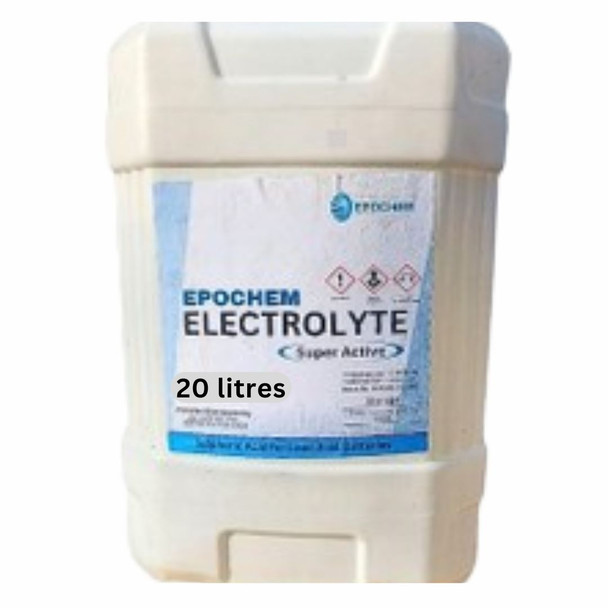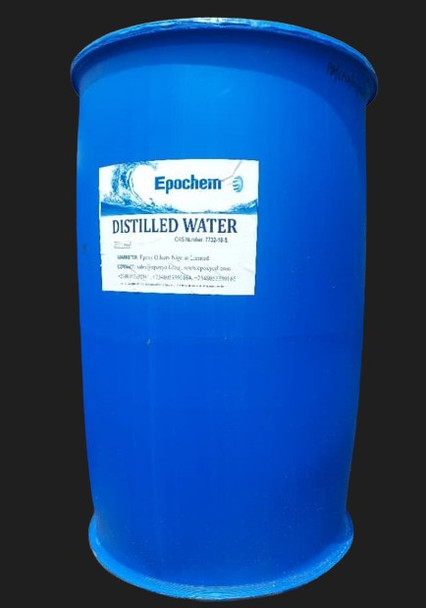Top Up Your Inverter Battery with Distilled Water: A Quick Guide
Inverter batteries are essential in homes and businesses, ensuring uninterrupted power during outages. These batteries store energy and release it as needed, powering your appliances and gadgets when electricity fails. However, like any crucial equipment, they require proper maintenance to perform effectively and last longer. One critical aspect of inverter battery care is topping it up with distilled water. In this guide, we’ll take you through why this is important, how to do it correctly, and what mistakes to avoid.
 Epochem Distilled Water 20 Liters
Epochem Distilled Water 20 Liters
Understanding Inverter Batteries
How They Work: Inverter batteries, particularly lead-acid batteries, have a simple but effective design. They consist of:
- Plates: Positive and negative lead plates submerged in an electrolyte solution.
- Electrolyte: A mix of sulfuric acid and water that facilitates chemical reactions.
When the battery charges and discharges, chemical reactions occur between the plates and the electrolyte, producing electricity to power your devices.
What is Distilled Water?
Distilled water is purified through a process that removes impurities, minerals, and ions. Unlike regular tap water, it is free from harmful substances that can damage the sensitive components inside your inverter battery.
Why Distilled Water is Essential
Distilled Water plays a crucial role in maintaining the battery’s electrolyte levels. During usage, some water evaporates due to the heat generated. If the water level drops too low, the electrolyte becomes too concentrated, potentially damaging the battery's internal components and reducing its performance.
 Energos 12V-220AH Tubular Battery
Energos 12V-220AH Tubular Battery
Benefits of Using Distilled Water
Distilled water ensures the right chemical balance in the battery, promoting:
- Efficient Performance: Smooth reactions result in consistent power output.
- Longer Lifespan: Reduced wear and tear on the battery's internal components.Effects of Using Tap Water or Impure WaterUsing tap water introduces minerals and contaminants into your battery, which can cause:
- Mineral Deposits: These clog the plates, reducing efficiency.
- Electrode Blockage: Impurities hinder the chemical reactions needed for electricity generation.
When and How Often to Top Up Your Inverter Battery
Signs Your Battery Needs WaterYour inverter battery will give clear signals when it needs water. These include:
- Visual Indicators: Most batteries have minimum and maximum water level markers. If the level is below the minimum, it’s time for a top-up.
- Performance Issues: A shorter backup duration could mean the electrolyte is too concentrated.
Recommended FrequencyIt’s advisable to check your battery's water levels every 2-4 weeks, depending on usage patterns and environmental conditions. Hotter climates or heavy usage may require more frequent checks.
Step-by-Step Guide to Topping Up Your Inverter Battery with Distilled Water
Preparation
Before you begin, it’s important to ensure safety and have the right tools:
- Turn off the inverter and disconnect it from the power supply to avoid electrical hazards.
- Wear safety gear, such as gloves and goggles, to protect yourself from the electrolyte.
- Gather the necessary tools:
- A funnel for controlled pouring.
- A clean jug of distilled water.
- A clean cloth to wipe any spills.
Steps
- Open the vent caps of your inverter battery carefully.
- Inspect the water level using the minimum and maximum markers on the battery.
- Use the funnel to slowly pour distilled water into each cell. Add water until the level reaches the recommended mark but avoid overfilling.
- Wipe off any spills immediately to prevent corrosion or damage.
- Replace the vent caps securely and clean the battery’s exterior.
Aftercare
Once you’ve topped up the battery:
- Allow it to settle for a few minutes.
- Reconnect the battery to the inverter and turn it on.
Dos and Don’ts of Topping Up Inverter Batteries
Dos
- Always use distilled water or water specifically designed for batteries.
- Check the water levels regularly and top up when needed.
- Ensure the battery is fully charged before adding water.
- Keep the battery terminals and surroundings clean and dry to avoid corrosion.
Don’ts
- Never use tap water or untreated water—it can introduce harmful impurities.
- Avoid overfilling the battery or adding water when it’s discharged.
- Keep metal tools away from the battery to prevent accidental short circuits.
- Avoid open flames or smoking near the battery to prevent accidents.
Common Mistakes to Avoid
Proper maintenance requires attention to detail. Some common mistakes that can compromise the health of your inverter battery include:
- Skipping Regular Checks: Neglecting to monitor water levels can lead to damage from low electrolyte levels.
- Using Impure Water: Minerals in tap water can cause blockages and reduce efficiency.
- Overfilling the Battery: Excess water can overflow and damage other components.
- Ignoring Safety Precautions: Failing to wear gloves or goggles can expose you to dangerous chemicals.
Prolonging Your Battery’s Life with Proper Maintenance
Proper maintenance can significantly extend the lifespan of your inverter battery:
- Maintain Correct Electrolyte Levels: Regularly top up with distilled water and monitor water levels to avoid drying out the battery.
- Clean Terminals and Connections: Corrosion on terminals can reduce efficiency. Clean them periodically with a mixture of baking soda and water.
- Schedule Professional Inspections: Have your battery checked by professionals for internal issues, voltage performance, and wear and tear.
- Avoid Deep Discharges: Regularly recharge the battery to prevent deep discharges, which can shorten its lifespan.
Where to Buy Distilled Water in Nigeria
High-quality distilled water is essential for your inverter battery’s maintenance. Producing it at home is not practical, as it requires specialized equipment to ensure purity. Here’s where you can source it:
GZ Industrial Supplies Ikeja
18 Adesina Street, Off Obafemi Awolowo Way,
Ikeja, Lagos.
Tel. 08098793805
GZ Industrial Supplies Lekki
Suite 10, Olive Plaza by Osapa London Bus Stop,
Lekki, Lagos
Tel. 090 557 935 56
GZ Industrial Supplies Apapa
10 Apapa Oshodi Expressway, Coconut Bus stop Opposite Total Jetty,
Apapa, Lagos
Tel. +234
GZ Industrial Supplies Port Harcourt
238 Aba Road, Onyejieke’s Plaza beside Fidelity Bank,
Rumuogba, Port Harcourt.
Tel. 080 533 901 29
GZ Industrial Supplies Calabar
30/32 Ndidem Usang Iso Road,
Mariam, Calabar.
Tel. +234
GZ Industrial Supplies Ogba
79 Yaya Abatan, by College Road
Ogba, Lagos
Tel. +234
 Epochem Distilled Water 200 Liters
Epochem Distilled Water 200 Liters
Factors to Consider When Buying Distilled Water
- Purity: Ensure the water is labeled as distilled and free from minerals and impurities.
- Packaging: Look for secure and durable containers to prevent contamination.
Troubleshooting Common Inverter Battery Issues
Even with proper maintenance, issues may arise due to improper water management or wear. Here are common problems and solutions:
1. Over-concentration of Electrolyte:
Signs: Crystals or salt deposits on the battery plates.
Solution: Dilute the electrolyte by carefully adding distilled water to restore balance.
2. Overfilled Battery:
Signs: Water spills or leakage.
Solution: Remove excess water with a clean syringe or consult a professional.
3. Poor Performance:
Signs: Reduced backup time or slow charging.
Solution: Check water levels, clean terminals, and ensure proper charging cycles.
Frequently asked Questions
1. Why is distilled water required for inverter battery maintenance?
Distilled water is free from minerals and dissolved salts—unlike tap or well water. These impurities can clog battery plates, hinder electrochemical reactions, and reduce battery capacity. Using distilled water helps prevent buildup and extends the life of the battery.
2. Can I use RO (reverse osmosis) water as an alternative?
Yes, RO water is purified to remove most minerals, making it generally safe for inverter batteries. However, aim for water with low total dissolved solids (TDS). Distilled water is still considered the best because it has virtually zero ions .
3. What can happen if I add tap water instead of distilled?
Tap water contains calcium, magnesium, and possibly chlorine all of which can cause sulfation, corrosion, and scaling. These residues block battery pores, lower efficiency, and shorten battery lifespan.
4. How often should I check or top up the water level?
Check your battery’s water level every 1–3 months, depending on usage and temperature. Refill only when levels drop below the minimum plate-covering mark, always doing so with distilled water.
5. Is distilled water essential for all battery types?
Primarily, yes lead-acid inverter batteries (especially flooded types) require regular refilling with distilled water to maintain performance. In contrast, sealed or maintenance-free batteries (AGM/gel) generally do not require water topping.
Related Article
Why Use Distilled Water For Inverter Battery
How Distilled Water Powers Up Your Inverter Battery
Conclusion
Regularly topping up your inverter battery with distilled water is a simple yet vital step in maintaining its performance and longevity. By following the tips and guidelines provided, you can ensure uninterrupted power supply and avoid costly repairs or replacements. Looking for high-quality distilled water for your inverter battery? Visit GZ Industrial Supplies today for reliable and affordable options. Keep your battery in optimal condition and enjoy hassle-free performance!













